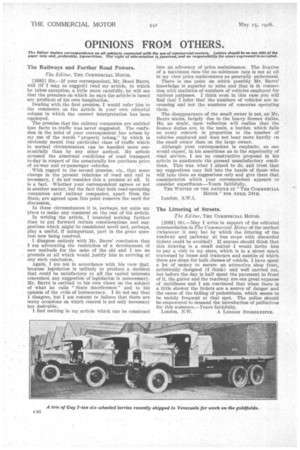OPINIONS FROM OTHERS.
Page 68

If you've noticed an error in this article please click here to report it so we can fix it.
The Editor invites correspondence on eal subjects connected with the use of commercial motors. Letters should he on one side of the paper only and, preferably, typewritten. The right of abbreviation Is joserved, and no responsibility for views expressed is accepted.
The Railways and Further Road Powers.
The Editor, THE, COMMERCIAL MOTOR.
.12682] Sir,—If your correspondent, Mr. Hood Barra, will (if I may so suggest) read my article, to which he takes, exception, a little more carefully, be will see that the premises on which he says the article' is based are products of his own iinagination.
Dealing with. the first premise, I would refer him to the comments on the article in your own editorial column in which the correct interpretation has been employed. •
The premise that the railway companies are entitled ipso facto to. traffic was never suggested. The confusion in the mind of your correspondent has arisen by my Use of the words • " properly belong," by which is obviously meant till at particular class of traffic which in normal circumstances can be handled more economidally than by any other method. My article stressed the abnormal conditions of road •transport to-day in respect of the unnaturally low purchase price of ex-war and ex-passenger vehicles.
With regard to the second Premise, viz., that some change in the present relations of road and rail is necessary, I 'do Mit-consider .this a premise at all. It is a fact. 'Whether your correspondent agrees or not is another matter, but the fact that both road-operating companies and • railway 'companies, apart from the State, are agreed upon this point removes the need for discussion.
In" these circumstances it Is, perhaps, not quite my place to make any comment on the rest of his article.
In writing the article, T intended nothing further than to put forward certain considerations and suggestions which might be considered novel and, perhaps, play a useful, if unimportant, part in the great question now being resolved.
I disagree entirely with Mr. Barrs' conclusion that I am advocating the restriction of a developme,nt of new methods for the sake of the old and I see no grounds at all which Would justify him in arriving at any such conclusion.
Again, I am not in accordance with his view that, because legislation is Unlikely to produce a decision that could be satisfactory to all the varied interests concerned, may suggestion of legislation is unnecessary. Mr. Barrs is entitled to his own views on the subject of what • he calls "State interference" and to his opinion of the evils of bureaucracy. I do not say that I disagree, but I am content to believe that there are many occasions on which control is not only necessary but desirable..
I find nothing in my article which can be construed
into an advocacy of price. maintenance. The fixation of a maximum rate Mitno minimum rate is not at all in my view price, maintenance as generally understood.
There is one point on which possibly 'Mr. Barrs' knowledge is superior to mine and that is in connection with statistics of numbers of vehicles employed for various purposes. I think even in this case you will find that I infer that the numbers of vehicles are increasing and not the numbers of concerns operating them.
The disappearance of the small owner is not, as Mr. Barrs states, largely due to the heavy, licence duties. He, no doubt, anon reflection will realize that the licence dutieS are, in the main, a burden which falls on every concern in proportion to the number of vehicles employed and does not bear more hardly en the small owner than on the large owner.
Although your correspondent is emphatic,, as one would expect, in his assertions as to the superiority of read service, I see no constructive proposal in his article to ameliorate the present unsatisfactory conditions. This was what I aimed to do, and trust that my suggestions may fall into the hands of those who will take them as suggestions only and give them that consideration which your Correspondent appears to consider superfluous.—Yours faithfully, THE WRITER OF THE ARTICLE IN "T COMMERCIAL MOTOR" FOR APRIL 24TH.
London, S.W.1.
The Littering of Streets.
The Editor, THE COMMERCIAL MOTOR.
[2083] Sir,—May I write in support of the editorial, commendation in The Commercial Motor of the method (whatever .it may be) by which the littering of the roadwaY and pathway at bus stops with discarded tickets could be avoided?.. if anyone should think that this littering is a small matter I would invite him to pay a visit to my store, which is in a street much traversed by buses and tramcars and outside of Which there are steps for both classes of vehicle. I have spent a lot of money to secure an attractive shop front, artistically designed (I think) and well carried out, but before the day is half spent the pavement in front of it, the gutter and the roadway are one greatexpanse of untidiness and I am convinced that when there is a little shower the tickets are a source of danger and the cause of the falling of pedestrians, which seems to be unduly frequent at that spot. The police should be empowered to demand the introduction of palliatives
for this nuisance.—Yours faithfully, .
London, N.W. A. LONDON STOREEEEEER.












































































































